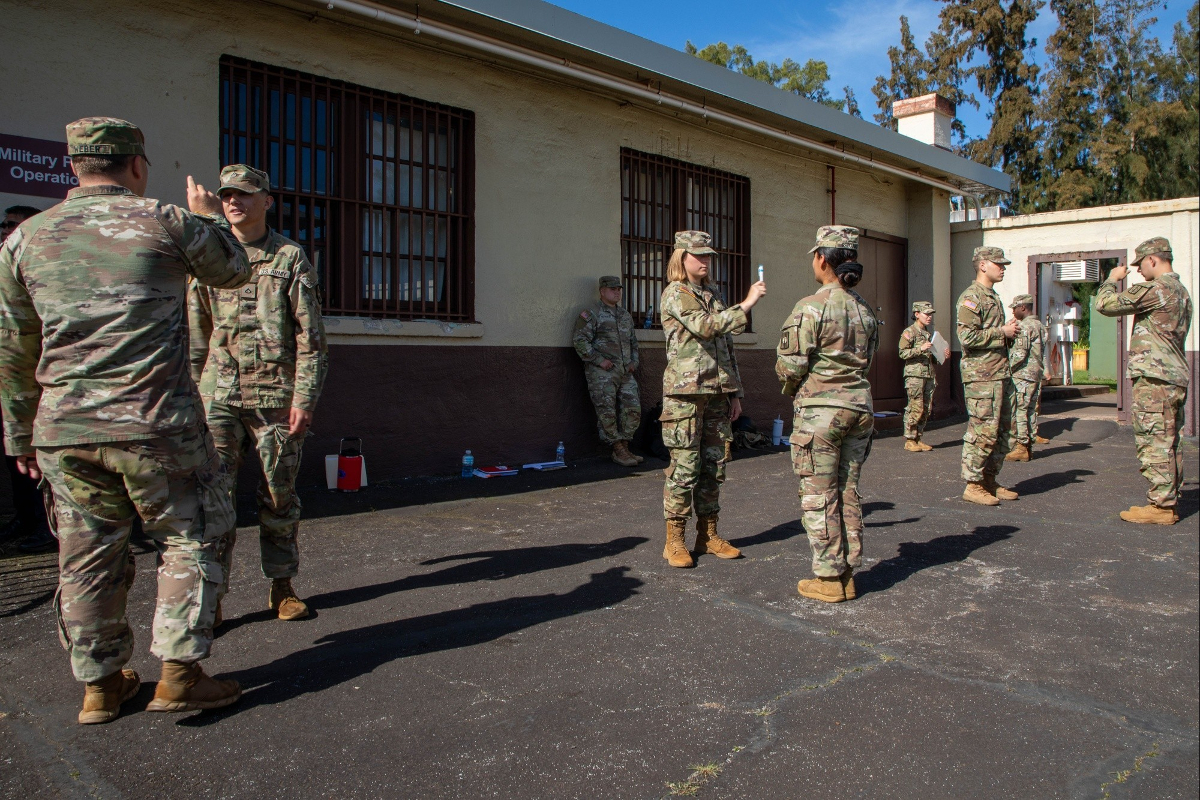
MPs Get Arrested for Field Sobriety Training
This data comes straight from the U.S. Army. Spc Devin Davis in fact. Who, if his Defense Visualization Information Distribution Service (DVIDS) hub report is any indication, is a crackerjack reporter in his own right. Then again, you don’t necessarily have to be a crackerjack to cover a buncha intentionally tipsy MPs, especially if their engaged in Field Sobriety Training..
You do have to have your facts in order though. And there’s no better place to have that happen than in field sobriety training.
Think about it:
“We’re looking at how the MPs write their statements and prove if a driver was intoxicated behind the wheel,” said Maj. Ferdinand Cristobal, deputy chief of police with the Department of the Army Civilian Police. “In court, they are going to have to articulate everything in detail. The main thing here is using the power of observation and working fast to get the evidence.”
According to Cristobal, observation writing is a critical step for every phase of the course, from the first phase, which deals with the vehicle in motion, to the second phase, personal contact, and the third and final phase, the field sobriety test. Good observation practices at these three stages will help police determine what actions to take next.
After instructing the students to write an observation statement, Cristobal asked a volunteer to test their statement in a hypothetical court scenario. This was to show the students that articulating their observations is just as important as writing them down.
All in all, it’s an absolutely on-target exercise in data gathering. And most certainly one in which observation can be relied upon.
Field Sobriety Training: The In’s and Out’s
As Spc. Devin Davis’s Schofield Barracks report makes crystal clear, Army military police are on this Hawaiian island of Oahu are here to train. Especially those with the 39th Military Police Detachment and 558th Military Police Company, 8th Military Police Brigade, who gathered together to conduct a three-day standardized field sobriety testing course on the barracks.
“This three-day certification course is approved by the National Highway Traffic Safety Administration,” said Cristobal, highlighting the test’s authority. “Our main goal is to become more proficient in handling intoxicated drivers.”
Patrolmen and traffic investigators used the battery of three tests to examine volunteer subjects, who signed a waiver to consume alcohol and test for any indication of impairment in a controlled environment.
“It’s fun to see the troops take what they learn and apply it to real life scenarios,” said Sgt. Riley Bonaventura, a traffic investigator with 39th MP Det., 8th MP Bde. “You can’t fake certain things, so for them to be proficient, they are doing wet labs on us to see if we’re drunk or not.”
This test consisted of horizontal gaze nystagmus screening – the involuntary jerking of the eye while in a resting position – walk and turn, and one leg stand.
Joining in…
Capt. Cody Wagner, a trial counsel with the 25th Infantry Division, also attended the classes to get more insight into the interactions between military police and suspects. His participation highlights the robust benefits to be provided by the field sobriety training course.
“This course will help me have a better understanding of who I think needs to be pursued and convicted versus other cases, which aren’t as serious,” said Wagner.
That’s especially important given Wagner’s role. As a special United States attorney, Wagner is responsible for prosecuting traffic violations on Army installations in Hawaii. This course has helped him understand the sobriety test process and what to look for when reviewing files and prosecuting cases.
To ensure the recruits keep up-to-date and in practice, patrolmen and traffic investigators must pass this course and certify once a year.
Field Sobriety, from the Field
Healing Properties wholeheartedly salutes the U.S. Army for putting together such a comprehensive field sobriety training program. One in which the participants can actually engage from both sides of the equation, and consequently feel the yin and the yang of drunk driving. That the training is focused on observational skills only makes it that much more robust and reliable.
We know Oahu is a beautiful spot – and Schofield Barracks is set right within that beauty. But we also know that ugliness, when it’s ignored, can creep into even the most beautiful places. The 39th Military Police Detachment’s field sobriety training will help ensure the ugliness of drunk driving is never left to fester on its own. We salute them!
If you or a loved one is battling substance abuse, please get in touch with Healing Properties. We’ve been helping men find sobriety since 2002; we’d be honored to help you too. Really.
Image: “8th MPs Get Tipsy for Field Sobriety Training” U.S. Army